#Spiritual Ecology
Explore tagged Tumblr posts
Text
Random Thoughts on Gods
The universe is numinous! As a kid, I just knew the spirit world was bustling with activity, and as I grew up, I realized that I wanted to see and understand the beings around me. I started with the gods because that felt closer to the spirituality I was raised in. I mean. I grew up watching my grandma pray to one god in the early morning light while standing on our front porch. So when I realized that "there are more things in heaven and earth than are dreamt of in your philosophy," it felt natural to start with the gods.
Since then, I've encountered and worked with more than just gods. There are many different types of spirits and, of course, the dead too. I still find myself coming back to the gods a lot in my practice. I don't ignore spirits and dead folks obviously. They're there and active so I do make connections with them too. But I gravitate to the gods pretty strongly in my Work.
I view the gods as energies/powers/forces. But still as real beings with their own personalities, (primary) jurisdictions to a point, agendas, and modes of operating across the worlds. Some gods are singular and unique "persons" while others are maybe more like "hives" wearing one face but still "people". Either way, they exist and I acknowledge their "personhood" even if I don't have a personal relationship with a particular deity. I know a lot of folks don't really think the gods are real or that they are separate entities that exist outside of the human mind. Some folks prefer to view the gods as complex human concepts, constructs embedded in the collective unconscious exclusively present for human support, enlightenment, and elevation. If that's you, then do you. However, I have *concerns* when someone asserts that their mental representation of something is the actual thing itself and vice versa.
I mean yeah. Because the gods are not typically physically present in the same way that humans physically take up space, I can see how a person might think the gods are *all* in our heads. That is definitely one stage that they play on, no doubt. But asserting that their existence is confined to that space and that space alone is strange to me.
While they may use the contents of our brains to craft garments for themselves and shape how they manifest, our brains aren't their only space to exist. From my perspective, they act on the worlds, whether we "see" them or not. They have agency and autonomy, independent of our conceptions of them. Just like some random person living on the other side of the world shaping their own life and the lives of those around them, or - if they have power and authority - shaping the rise and fall of a nation.
As a side note, I actually don't think the gods (any of god) are any of "The Omnis": omnipotent, omniscient, or (in many cases) even omnipresent. Being a god and having power, authority, and/or influence as a god don't require any of those three things. It's not all or nothing. The gods are a part of a spiritual ecology. They are one potent force in the universe among many, including animals, humans, random spirits, dead folks, etc!
This post is a little rambly but like I said, I enjoy conversation. What do you think about all this?
3 notes
·
View notes
Photo
* * * *
A Shamanic View:
Medicine for the Earth by Sandra Ingerman
In all spiritual traditions it is taught that everything that manifests in the physical world starts in the invisible realms of spirit.
We must remember that a baby grows in the womb. Trees and plants start with a seed that is nurtured in the earth and then expands into roots, branches, leaves, buds, fruits, and flowers.
Creation comes through us.
We often expect change just to happen magically without the inner work that is needed to create outer change. We want science to magically create "a cure" for all the ills of our times. But the true changes we are looking for must come from within. We need to incorporate spiritual practices into our daily lives and live the practices.
We need to be able to work through the dark states of consciousness and transform them into golden light. This is the true meaning of alchemy. And then our outer world will reflect our state of light back to us.
We must remember that we are not just form and matter. We are luminous beings. And our destiny is to radiate light.
Right now many of us walk around with unexamined thoughts, attitudes, and emotions. We live a life filled with fear and this generates states of hate and war. We believe that there is scarcity of resources and that we are limited in what we can create. This is a reflection of how we live from a place of separation.
The ultimate teaching is, "It is who we become that changes the world and not what we do." The part of us that is "becoming" involves remembering that we are spiritual beings whose destiny is to radiate light and channel unconditional love. We came here to learn about the power of love and to create from love. The part that we are "doing" involves how we walk on this earth as conscious beings. We must be conscious of every action, thought, and word. For once again, our outer world is a reflection of our inner state.
Excerpted from 'Spiritual Ecology: The Cry of the Earth', chapter 'Medicine for the Earth' by Sandra Ingerman.

Albarran Cabrera —– Instagram
The Mouth of Krishna
2022, #60907. Pigments, gampi paper and gold leaf
#Sandra Ingerman#Spiritual Ecology#consciousness#Body Alive#Albarran Cabrera#The Mouth of Krishna#quotes
962 notes
·
View notes
Text
A Talk by Emmanuel Vaughan-Lee, Executive Director of Emergence magazine
0 notes
Text
Why the World Needs Spiritual Ecology - Atmos

0 notes
Text
Embracing Spirituality: Welcoming the First Day of Spring
As winter’s icy grip loosens and nature begins to stir from its slumber, there’s a palpable sense of renewal in the air. The first day of spring, also known as the vernal equinox, marks a significant moment in the celestial calendar and carries profound symbolism across cultures worldwide. It’s a time of transition, of balance, and of awakening—a perfect opportunity to reflect on spirituality and…

View On WordPress
#Healing#Psyhcic Gypsywind#Spiritual Awakening#spiritual awareness#spiritual blog#Spiritual Ecology#spiritual evolution#Spring Blogs#Spring Equinox#Springtime#Starseed awakening#Starseed Psychics
1 note
·
View note
Text
(A Rwandan talking about his experience with Western mental health and depression):


“We had a lot of trouble with Western mental health workers who came here immediately after the genocide."


They came and their practice did not involve being outside in the sun where you begin to feel better.

There was no music or drumming to get your blood flowing again. There was no sense that everyone had taken the day off so that the entire community could come together to try to lift you up and bring you back to joy. There was no acknowledgment of the depression as something invasive and external that could actually be cast out again.


"Instead, they would take people one at a time into these dingy little rooms and have them sit around for an hour or so and talk about bad things that had happened to them.
We had to ask them to leave.”
--from Spiritual Ecology
0 notes
Text






MATRIX
The layers of the body
Like roots of forest trees
Are interwoven into one
The matrix, the deep underworld
Speaks as images, vision & dream—
As our feelings & thoughts
There is a forest under the skin—
— with interconnected root systems,
— the cellular matrix,
— the deep underworld,
— in which information flows,
— as electromagnetic & molecular currents
The underworld currents,
Are felt-sensations of aliveness,
Presenting to Consciousness,
As dreams & thoughts
There is two-way transduction
Between mind & matrix—
DNA reveals itself to mind—
And mind feeds back onto DNA
Layers are woven
Into one whole
In which sacred balance
Is delicately kept
#ecm #extracelularmatrix #ecosystem #spiritualecology #ecospirituality #roots #forest #animism #witch #wholeness
#extracellular matrix#magick#rta#dna#mindbody#ecosystem#homeostasis#spiritual ecology#ecospirituality#ecospiritualism#dreaming#shamanism#witch#alchemy#spiritual journey#shamanic journey#underworld
0 notes
Text

#love#quotes#spiritual#inspiration#life#save the world#nature#ecology#environmental science#spirituality#spiritual awakening#spiritual awareness#spiritual community#spiritual development#spiritual healing#spiritual journey#spiritualgrowth#spiritualguidance#spiritual warfare#awakening#consciousness#world
72 notes
·
View notes
Text
I just woke up at 7 am exactly w a weird feeling, then a few minutes later my whole room is rumbling and I can hear the glass in my window rattling. It lasted about a minute or two. I actually thought there was an earthquake for a few minutes there. But no, just Space-X launching their "Super Heavy" rocket, the "most powerful launch vehicle ever built', about 25 minutes away from my home. I cannot even describe how much I hate Space-X for all that they've done to my community and the environment in which we live. Musk has inflicted SEVERE and unforgivable harm upon land extremely diverse in plant and animal species (we have the 2nd highest concentration of wildlife next to Everglades!!), has made sea turtle nesting sites unsafe and unusable for the turtles, and is encouraging the gentrification of our culturally unique border community. Not to mention, the land which he disrespects so blatantly is occupied by the Carrizo Comecrudo tribe and is extremely significant to the indigenous peoples of this region. My own ancestors relied on this coastal environment for nourishment and safety, and it has always been a source of peace and love for my family and myself.
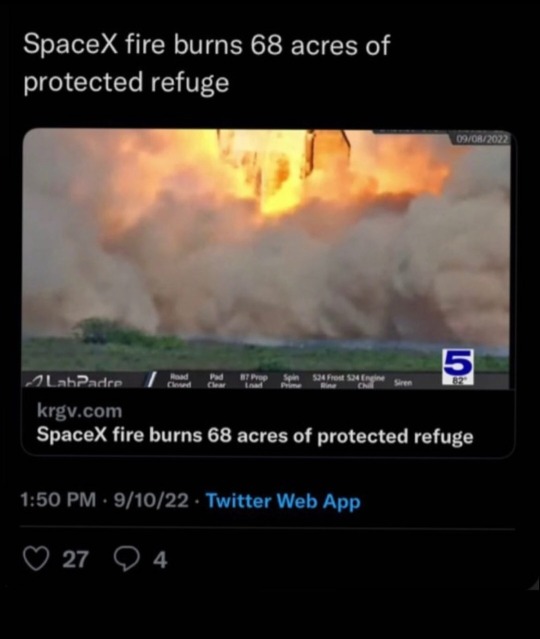
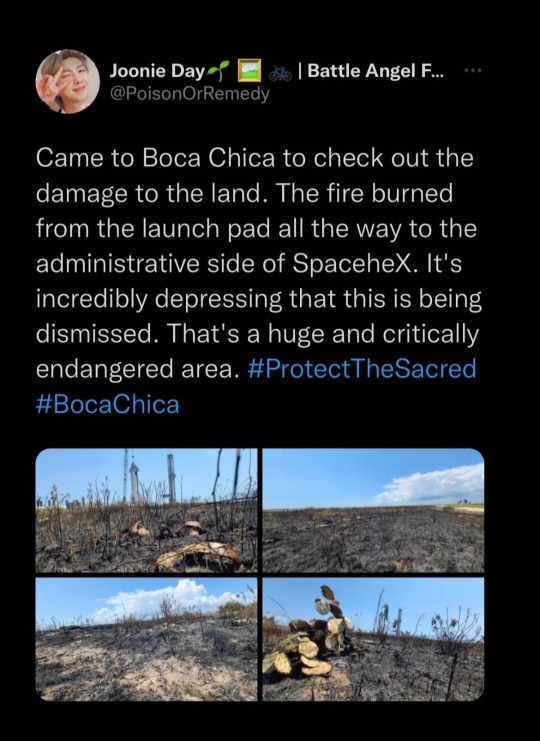
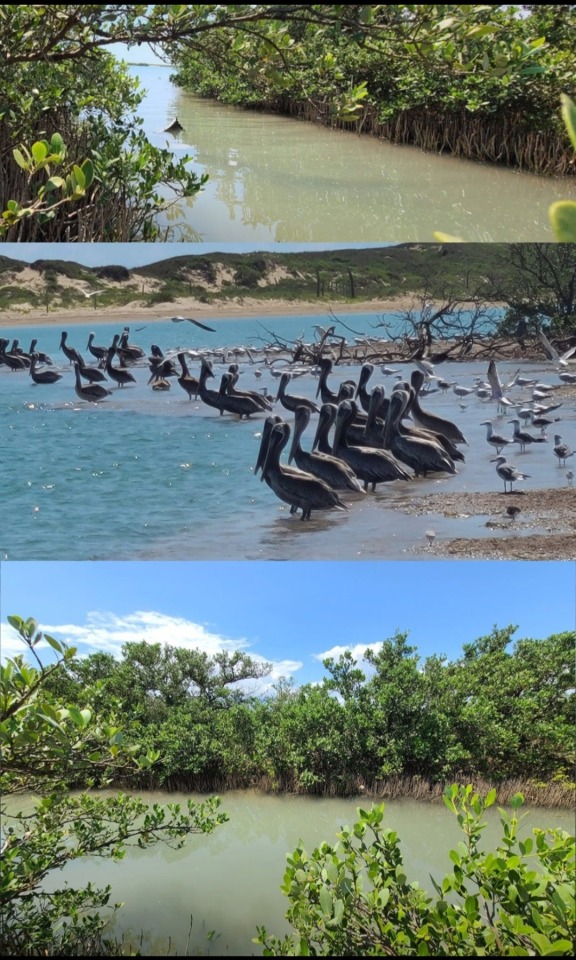


#space x#ocean witch#sea witchcraft#spirituality#ecletic witch#environmentalism#environmental science#sea witch#bruja#witchblr#south texas#ecology#anti space x#tamaulipeco#marshland#ocean#conservation#mangrove#black mangrove
586 notes
·
View notes
Text
If a little pebble thrown into the sea puts the water in action, one hardly stops to think to what extent this vibration acts upon the sea. What one can see is the little waves and circles that the pebble produces before one. One sees these, but the vibration that has been produced in the sea reaches much further than man can ever imagine. What we call space is a much finer world. If we call it sea, it is a sea with the finest fluid. If we call it land, it is a land that is incomparably more fertile than the land we know. This land takes everything in it and brings it up, it rears it, it allows it to grow—our eyes do not see it, our ears do not hear it.
Hazrat Inayat Khan, The Mysticism of Sound and Music
#quote#Hazrat Inayat Khan#Inayat Khan#music#sound#acoustics#Sufism#mysticism#nature#sea#water#ocean#landscape#ecology#spirituality
70 notes
·
View notes
Text
esoteric girl winter
#doing a reading course on kabbalah and taking courses on ecological spirituality and sufi mysticism#personal
51 notes
·
View notes
Text


“For me, wherever I go, I know my natural and eternal environment, and I know it as part of me and me of it. Beyond whatever we think, there is a darkly glimmering mystery far beyond reason and sanity, but full of the wholeness of beauty. It perpetually sustains and bestows all things with their own nature and being- perfectly, fully and without need for further elaboration or rectification. This is the sorcerous conception of deity.”— Robin Artisson, The Toadbone Treatise
It’s December and the air is warm here.
I peer out my window with drink in hand, watching the blood-splashed sun collapse beyond the horizon and into the highway. For a moment I relish being in a State where drinking a lime-juice cocktail isn’t a desperate plea for warmer days. Here winter never comes, and as such, we never need to change our tastes to heartier or heavier food and drink.
The Southeast is the only home I’ve known: a land of sweltering heat, mosquitoes the size of your arm, and uninterrupted madness via Florida Man. Where I dwell is nothing special: an average middle class town, the wonder and mystery of the city far away and only faintly sensed. The hustle and bustle of modern living remains only a faint rumor on the wind. Life moves along uninterrupted, save for twinges of change here and there. I can imagine such a life would not be enough for some, and truthfully it’s not enough for me. But in the meantime, there’s no rush; I drink deeply from the land and Spirits around me.
I think about Gordon’s piece on Natural Magic, the equation of Self+Spirit World+Place. It rings true to me. I think about the natural world around me, my own slice of it. Underneath the regular suburban dregs still beats the heart of that wild Florida, in every thicket and every wood. In them I’ve rattled open doorways between realms in areas smaller than some public parks, I’ve spoken with Swamp Spirits and learned the unspoken keys to plant identification, and I’ve traded payment and favors with the local Dead and seen them manifest right before my eyes. All these things happened in my hometown not in spite of it, but through it.
The great lesson of Folk Magick has always been that magick was right at hand, that you didn’t need a library of books or special clothes and wands to do it. In Hoodoo a quick trip to the grocery store and some significant places around town will allow you to hurl just about anything at people. When I’m particularly stuck for an ingredient I always go Journeying into the Spirit World and ask my friends there what might do the trick. And often the most powerful gifts are the simplest.
I came to read playing cards, to cast my eyes into the twisting nether realm of probability and possibility not through some online course nor through paid lessons from a teacher. I went down to the crossroads for nine nights around 11:45pm and called out to the One Who Dwells There to teach me, the only sacrifice being the time I spent there. And teach me He did. I found whole new ways of looking at the cards, as books and ideas seemed to drop into my view from all over; I read what I could, but the biggest advances seemed to come from just being out there, alone and in the dark, hearing whispers in my head and seeing symbols dance before my eyes. I read the cards now with great accuracy, with my window into the shifting seas of potentiality amounting to an admission fee of one dollar.
Often in life our own worlds can seem disenchanted, our existences too far away from any of “the action” to feel meaningful. As in spirituality so too in politics: the same way my heart longs to stir up the dead in St. Augustine it flutters at thoughts of joining in armed resistance somewhere in the streets of Rojava; as I ponder the possibilities of protective mojos made and blessed with the dirt from Castillo de San Marcos, I wonder what revolutionary potential I could add to the people’s struggles in Baltimore, Oakland, Chiapas, and Greece. Economics and familial ties, at least for the moment, always get the upper hand.
But I do not rest on my laurels. I read, I study, I speak with those around me. I consider myself the advance guard, the agent behind enemy lines. I gather folks of like mind around me and we plan, we plot, we create pockets of resistance and freedom. We are the first cells of the revolution you see, mitochondria that will one day evolve into a greater being. We put pamphlets, we put up posters, we engage in Direct Action. Rather then wait for ‘THE Revolution” I’ll do what I can here and now, building “the new world in the shell of the old.”
Those that simply wait for monumental change, or worse vote in the hopes it will come, display a distinctly unmagical air about them: they don’t believe anything can change unless everything does, they can’t imagine that their actions could move even the tiniest mole hill, they huff that the time is never quite ripe, that until some Unknown Messiah arrives we’d best simply hope for change.
Surely we, through direct experience, know better then this?
Can’t a hidden gesture or half-mumbled phrase move someone’s mind? Won’t a fervent prayer, a simple oil, and an intensity of Will attract unseen hands to guide you? Doesn’t the simplest mix of red pepper, black pepper, and sulpher cause the flames of hell to leap up at our command? You can’t have it both ways: either you and your allies can literally shift the movin’ and shakin’s of the luck plane as well as this artifice we call physical reality, or it’s all a sham.
I don’t know about you but I’ve got notebooks filled with proof that what we deem “inevitable” or “unmalleable” is plainly not so.
Magic presupposes we can change the foundations of the world around us. Why do our political beliefs so often not follow this maxim? Why are we waiting for some Vanguard, some Party, some Candidate, to rip up the noxious weeds of Capitalism and The State? Did we come by any of our magical knowledge by waiting or did we simply go out and start doing what we could? Wasn’t every bump in the road a lesson, every victory a confirmation that even against the odds we can win?
My tradition courses through the land and was born in struggle: against the State, against the Boss, against the Police. Under candle light and shroud of burning herbs I can feel the air thick with those that whispered or sang prayers in other times; they know, they understand: the battles may be different, the symbols may have changed, but the struggle has not. Candle flames burst with the same heat and energy raging away in my heart, teeth gritting in Nietzschean Will to change the world and break anything that stands in my way. Road Opener work or Revolution, what’s the difference?
My tradition is not alone: anyone laying hands on the practical magic of the past is touching a People’s History. You did what you could with what you had on hand, including whatever ghosts and goblins happened to be around. These people were in the same boat we are: under the heel of an oppressive state apparatus, one that could kill them at any time, all for the service of an economic elite. They too watched an increasing portion of all the value they created get siphoned away, hunger pangs and anxiety the mother of many a prosperity spell. Any good witchcraft carries with it the sublime scent of necessity; by the time you’re in the woods at midnight making pacts with unseen things it’s safe to say the usual channels of change have been blocked.
What else is magic but the metaphysical embodiment of Anarchism, of politics on a spiritual plane? That YOU could defy the laws of the “Lord” and make new arrangements for yourself, that YOU could gain insights and knowledge beyond your “station” in life, that YOU needn’t wait for someone to save you because you were going to save YOURSELF? Isn’t that what Sorcery is all about? Wasn’t it a battle against the dragon Zarathustra spoke about, the one that must be defeated, that must be slain?
“Who is the great dragon whom the spirit will no longer call lord and god? ‘Thou shalt’ is the name of the great dragon. But the spirit of the lion says, ‘I will.’ ‘Thou shalt’ lies in his way…”
The day is dead now, street lights and shabby store signs acting as artificial suns. The lights manage to keep the hum-drum thoughts of day still near, a collective religious belief in the firm and unvarying nature of reality, that nothing has nor will it ever change. The lights bring stability and safety. In this warm paradise where winter never comes it’s easy to believe the lie that most things are unwavering, that some things just stay the same.
For instance, global capitalism or a client’s bad luck?
But I have neither the time nor the inclination for such adult bed-time stories. I close the blinds and set about the work of changing the world around me. To succumb to the thoughts of static existence, of even settled accounts is preposterous. I call out to the Unseen with techniques and tricks propelled into the future by the most disadvantaged in this region while the plantations of the past have gone from places of frightening power to mere relics. While others buy and sell my soul flies right down to the primal, throbbing tap-root of the land around me; what was once an altar in any other townhouse becomes the Crossroads of All Existence; my voice no longer my own, my body wracked with spasms, I become a conduit for things that others claim can’t or shouldn’t exist.
Impossible? Can’t? Won’t? Shouldn’t? All these words are nothing to me! There is only The Will. And if you Will it, it is no dream.
#witchblr#witchcraft#folk magic#witches#Egoist-Communist#insurrection#liberation#Magic#occult#paganism#spirituality#autonomous zones#autonomy#anarchism#revolution#climate crisis#ecology#climate change#resistance#community building#practical anarchy#practical anarchism#anarchist society#practical#daily posts#communism#anti capitalist#anti capitalism#late stage capitalism#organization
7 notes
·
View notes
Photo
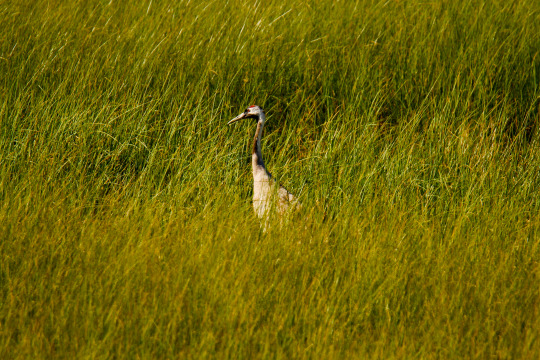
Just like many birds, many indigenous people of Siberia and Mongolia are nomads. They go to different places during different seasons. This they did this to not exhaust the pastures and benefit from the local resources best. In other words they travel to the place they best fit into the ecosystem. Many governments forcibly settled the indigenous people and stropped their nomadic lifestyle. This not only lead to destruction of culture but also destruction of ecosystems. Overgrazing causes desertification. people are must all their resources from a habitat single habitat, rather than taking only that what a habitat can spare before moving along. Instead of settling nomadic people the world should learn for the traditional lifestyle. To not exhaust local habitats. The bird in the picture is a Grus grus, Common Crane
#tengerism#tengrism#tengri#eternalbluesky#sky#shaman#siberianshamanism#pagan#animism#polytheism#wisdom#spirituality#nature#natureworship#naturephotography#sustainability#environment#ecology#savetheplanet#indigenous#wildlife#bird#birds#birding#birdphotography#wildlifephotography
77 notes
·
View notes
Text






~ Coastal Moodboard #2 ~
Yesterday I met a good friend of mine on the beach 💙 She had to leave after a little more than hour, and I spent the rest of the day there. I visited 3 beach accesses in total, from South to North. I saw and enjoyed some beautiful birds and water, but not as many seashells as I was hoping. I collected a few lovely common Ark shells, but nothing that really stood out. Because it was a Saturday and there were more people than usual, and because the waves and riptides were particularly strong
1) Mexican Olive tree trimmings from the tree in my garden
2) one of my favorite thrift finds ever!!! I found this absolutely beautiful scallop on a cheaply made necklace for a very low price! I removed it from the necklace and the scallop is on my altar now 🩷 I plan to reuse the wooden beads that were on the necklace for future jewelry pieces
3) Black Skimmer. I haven't seen this species in a long time! But she was so fascinating to watch! You can see in the photo that this bird glides along the water's edge with their mouth open, collecting small fish, crustaceans, and mollusks! She did this back and forth a few times, then went Northward, away from me
4) A pelican in flight! I saw several groups and pairs looking for and hunting fish. Last week at the beach when I did some spiritual work, I saw a group of 10 pelicans!!
5) Sanderling. A species of sandpiper! They're so cute!! 🩷
6) my favorite photo I've taken of pelicans so far!
#coastal#gulf of mexico#south texas#beach#ocean#shells#seabirds#birds#pelicans#sirencore#mermaidcore#oceancore#spirituality#witchblr#witchcraft#texas#herbalist#environmental science#environmentalism#ecology
10 notes
·
View notes
Text
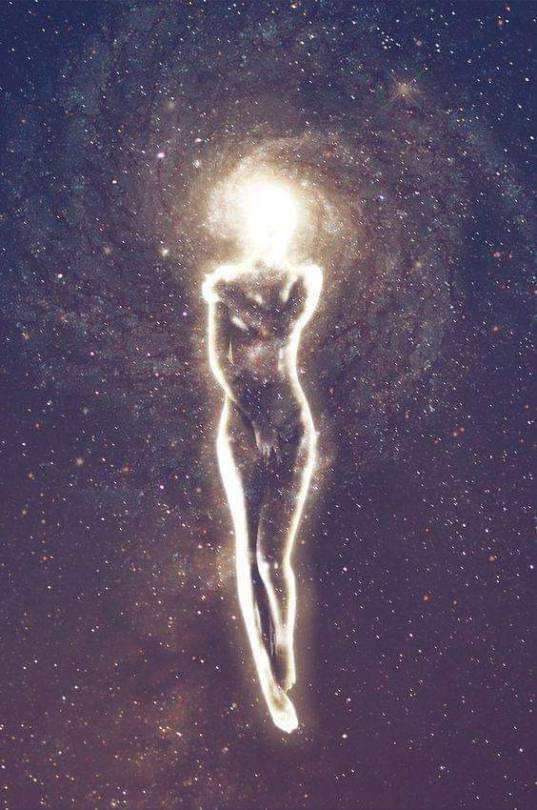
Wake up now Humans to your Divine inner Truth !...You're Eternal Spiritual Beings of Love's Consciousness !...You're all Light of the Infinite Universe !...You've a Sacred Mission which is not to destroy,but to Co-create Heaven on Earth !..
© Samissomar © Samissomar
http://samissomarspace.wordpress.com
#poetry#consciousness#spiritual#divine#truth#light#eternal#peace#love#awakening#humanity#aliens#contact#disclosure#earth#universe#balance#evolution#ecology#sacred#mother
46 notes
·
View notes
Text
Braiding Sweetgrass: Reciprocity with Nature

Robin Wall Kimmerer's Braiding Sweetgrass: Indigenous Wisdom, Scientific Knowledge, and the Teachings of Plants is a profoundly moving blend of personal narrative, scientific inquiry, and Indigenous storytelling. The book explores the interconnections between humans and the natural world, presenting a holistic vision of ecological balance, reciprocity, and gratitude. Kimmerer, a botanist and a member of the Citizen Potawatomi Nation, brings a unique dual perspective to her work, blending scientific understanding with Indigenous traditions.
Key Themes and Insights
Reciprocity with Nature
At the heart of Braiding Sweetgrass is the idea of reciprocity--a mutual exchange of care and respect between humans and the Earth. Kimmerer illustrates this concept through the teachings of the "Honorable Harvest," a traditional Indigenous practice that governs the ethical taking of resources. These teachings emphasize principles such as taking only what is needed, using everything taken, and giving thanks in return. By living in alignment with these principles, she argues, humans can foster sustainable relationships with the environment.
2. Indigenous Knowledge and Scientific Inquiry
The book bridges two often disparate worldviews: Indigenous knowledge, which is rooted in spiritual and relational connections to the land, and Western science, which focuses on observation and empirical evidence. Kimmerer critiques the limitations of Western science when it disregards the wisdom embedded in traditional ecological knowledge. She calls for a synthesis of these perspectives, demonstrating how science can be enriched by Indigenous ways of knowing.
3. The Language of Plants
Kimmerer presents plants as teachers and storytellers. She explains how Indigenous peoples view plants not as resources to exploit but as living beings with their own gifts to share. The quintessential sweetgrass, for example, is a sacred plant in Potawatomi culture, symbolizing healing, gratitude, and connection. Kimmerer weaves its story throughout the book, using it as a metaphor for reciprocity and care.
Structure and Key Chapters
The book is divided into five thematic sections, each mirroring one of the braids in sweetgrass: Planting, Tending, Picking, Braiding, and Burning. These sections guide the reader through cycles of growth, care, and renewal, both in nature and in human relationships.
Planting
This section explores Kimmerer's early experiences with nature and her awakening to the dual perspectives of science and Indigenous traditions. She reflects on her childhood love of plants and her journey into the field of botany, noting how her academic training initially distanced her from the relational understanding of nature central to her Potawatomi heritage.
2. Tending
Here, Kimmerer delves into the act of caregiving for the land. She discusses practices like gardening, which are deeply intertwined with the cycles of nature and the responsibility of stewardship. Through the story of pecans, Kimmerer illustrates how Indigenous peoples cultivated landscapes in ways that sustained both human and ecological communities.
3. Picking
In this section, Kimmerer shares lessons on gratitude and the ethics of harvesting. She recounts how Indigenous teachings emphasize the need to approach nature with humility and reverence. Her story of gathering wild leeks highlights the importance of balance: taking only what is needed and ensuring the plant's ability to regenerate for future generations.
4. Braiding
This pivotal section ties together the threads of the book, emphasizing the interconnectedness of humans and the natural world. Kimmerer reflects on the power of storytelling and ceremony in fostering a sense of belonging and respect for the Earth. She contrasts the capitalist mindset of extraction and commodification with Indigenous practices of reciprocity and care.
5. Burning
The final section focuses on renewal and transformation. Kimmerer discusses controlled burns as a traditional ecological practice that maintains the health of certain ecosystems. This metaphor extends to human lives, suggesting that embracing change and letting go of harmful practices can lead to regeneration and growth.
Lessons and Takeaways
Gratitude as a Way of Life
One of the book's central messages is the importance of gratitude. Kimmerer describes rituals like the "Thanksgiving Address," a Haudenosaunee (also known as the Iroquois Confederacy or Six Nations--Mohawk, Oneida, Cayuga, Onondaga, Seneca, and Tuscarora) tradition that expresses appreciation for all elements of the natural world. Gratitude, she argues, fosters a mindset of abundance and responsibility, countering the destructive tendencies of consumerism.
The Role of Stories
Stories play a vital role in Braiding Sweetgrass. They carry cultural knowledge, teach moral lessons, and cultivate empathy. Kimmerer uses storytelling to bridge the gap between Indigenous wisdom and modern readers, showing how narratives can inspire a deeper connection to nature.
Healing Through Connection
Kimmerer underscores the idea that healing the planet is inseparable from healing human relationships with the Earth. She advocates for a shift from a worldview of domination to one of partnership, where humans see themselves as part of, rather than separate from, the natural world.
Relevance and Impact
Braiding Sweetgrass resonates with readers across diverse backgrounds, offering both practical advice and spiritual inspiration. It challenges the dominant narratives of environmental exploitation and invites individuals to reconsider their role in ecological systems. The book has become a cornerstone of environmental literature, celebrated for its poetic prose and profound insights.
By blending science with Indigenous wisdom, Kimmerer provides a compelling roadmap for sustainable living. Her call for reciprocity, gratitude, and humility offers hope in an era of ecological crisis, reminding readers that restoring balance with the Earth is both an individual and collective responsibility.
Conclusion
Robin Wall Kimmerer's Braiding Sweetgrass is more than a book; it is an invitation to rethink how we live and relate to the world around us. Through her poetic storytelling and unique perspective, Kimmerer inspires readers to cultivate a deeper sense of respect and reciprocity with nature. Whether one approaches it as a work of environmental philosophy, a spiritual guide, or a celebration of Indigenous knowledge, Braiding Sweetgrass is a transformative text that encourages harmony, gratitude, and stewardship in the face of pressing ecological challenges. Read a sample of Braiding Sweetgrass (paid link).
5 notes
·
View notes